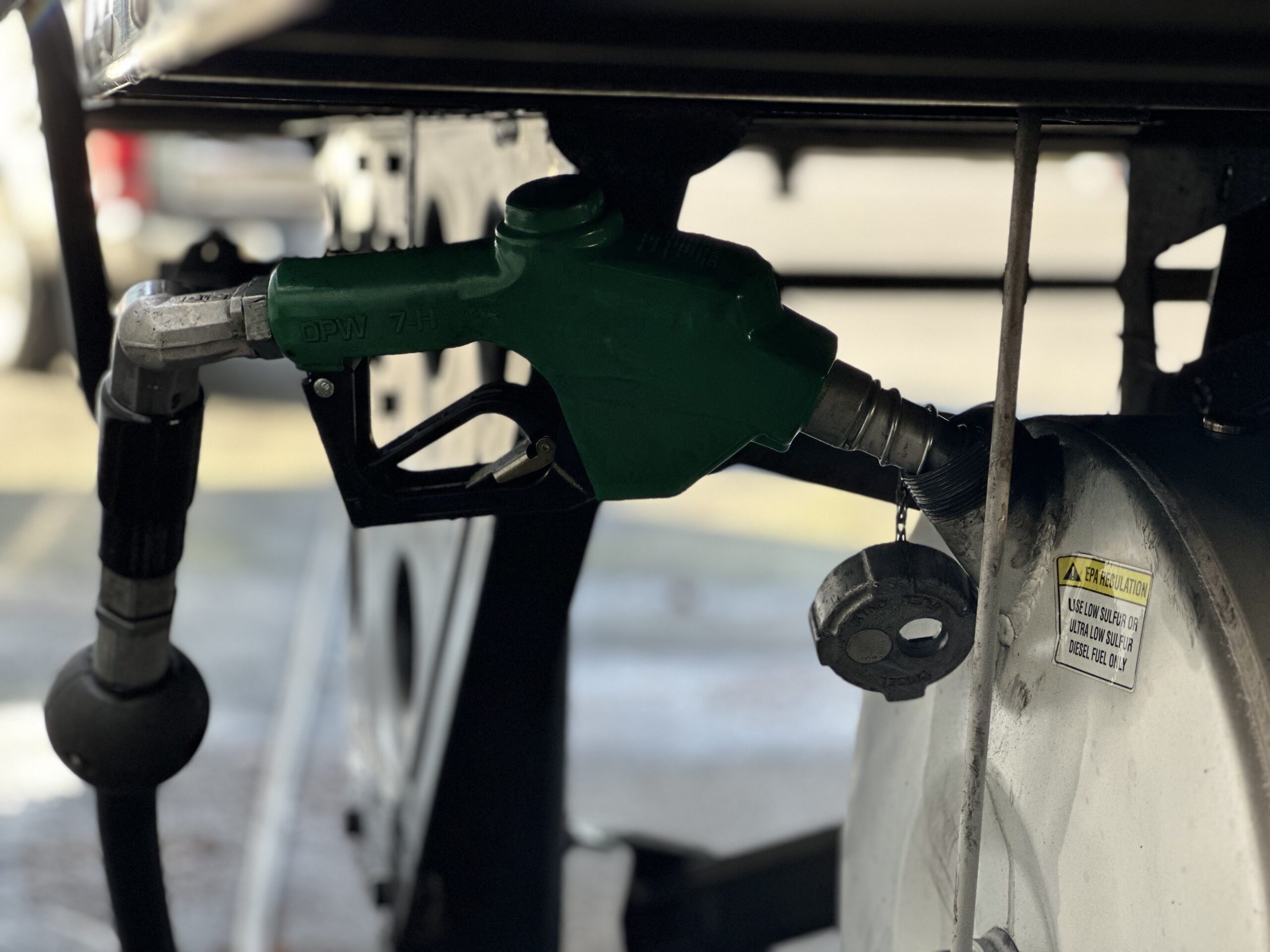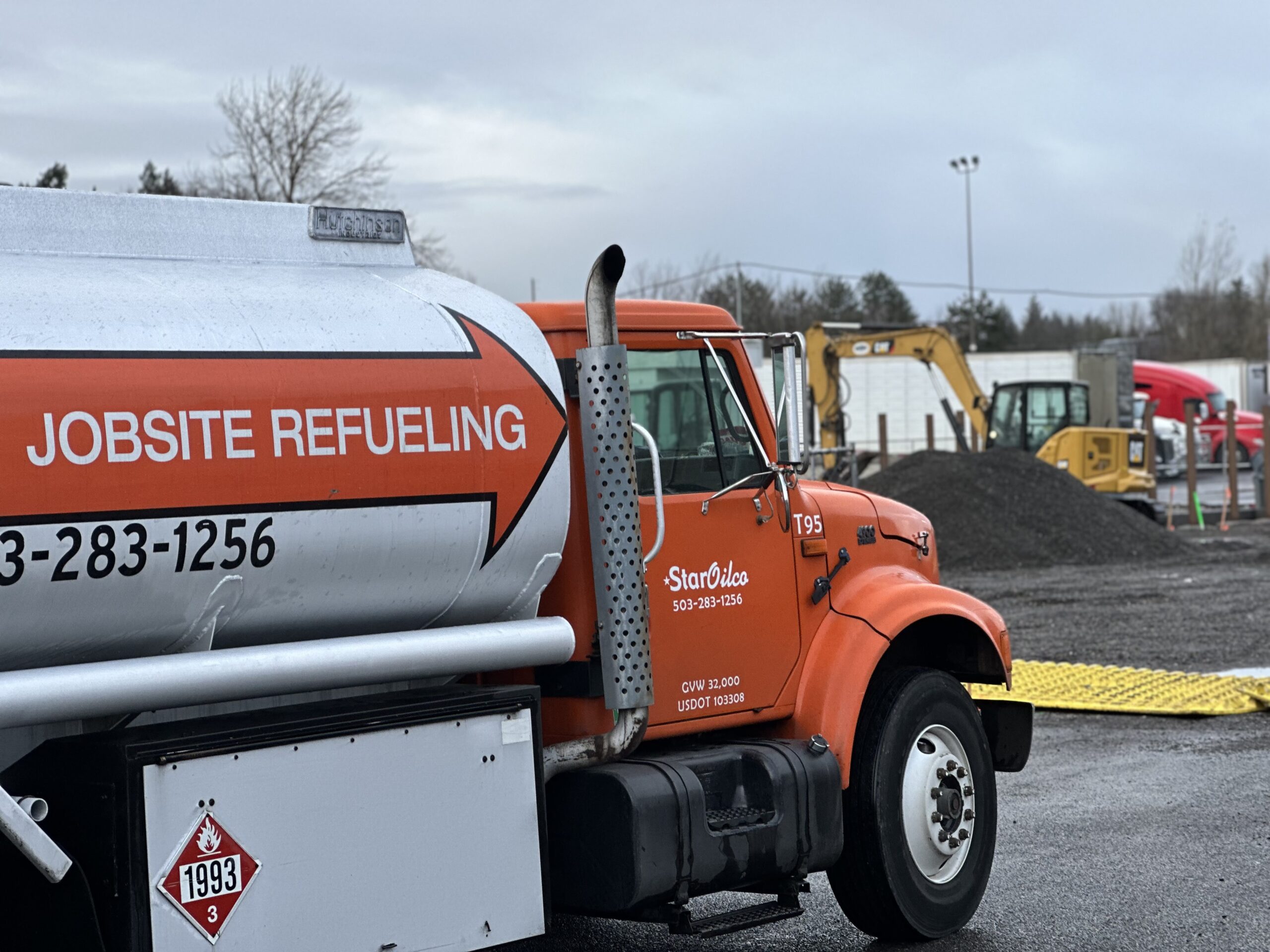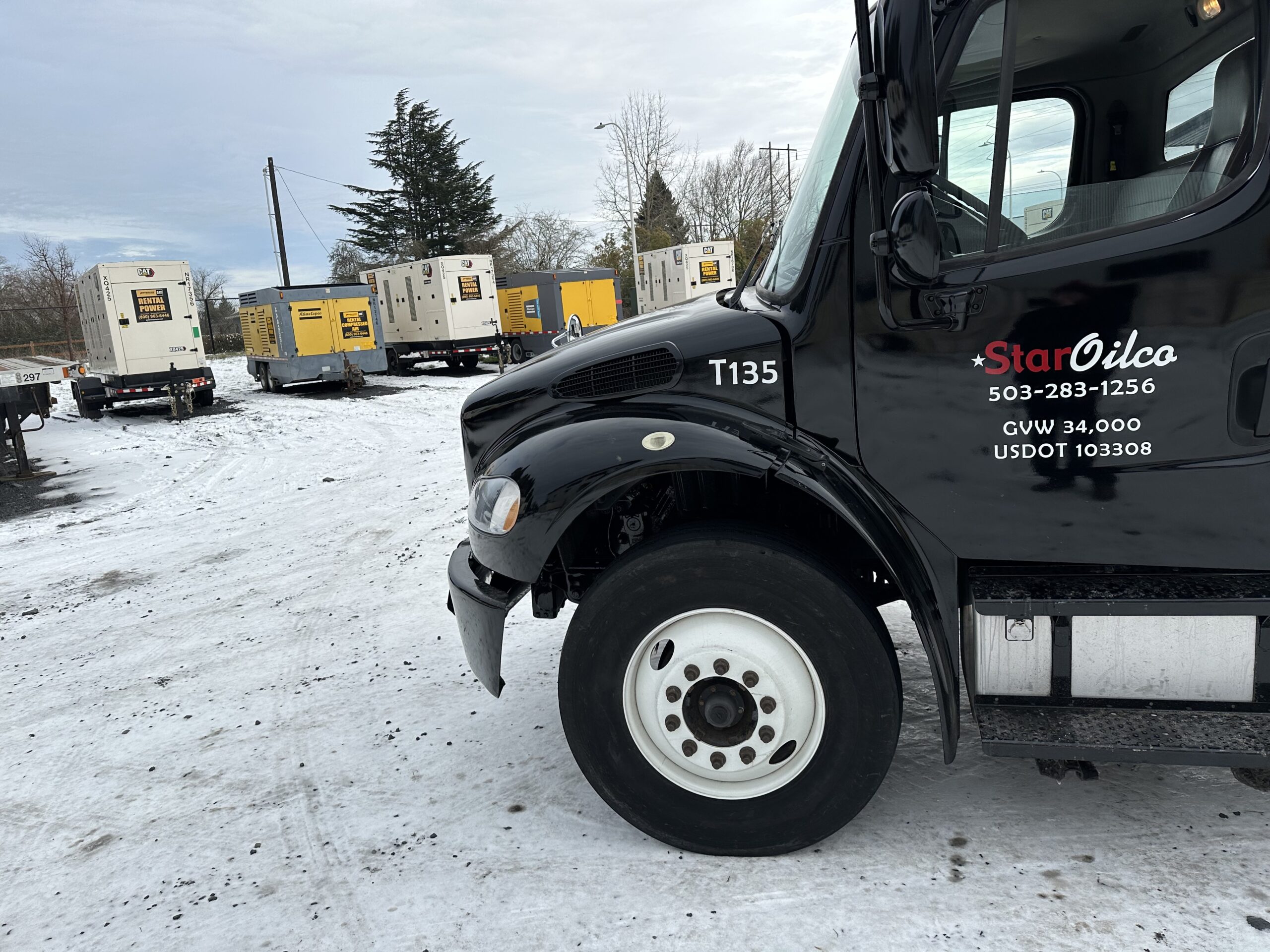Off-road diesel is an important fuel that powers heavy equipment and machinery for industries like construction, farming, and transportation. It’s a popular choice because it’s affordable and reliable for tough jobs that need a strong energy source. In the Portland, Oregon metro area, fuel rules are getting stricter, especially with laws pushing for cleaner, renewable fuels. That means businesses using off-road diesel need to stay informed about the latest regulations and fuel options to keep running smoothly and legally.
This guide breaks down everything you need to know about off-road diesel, including how it’s used, the laws surrounding it, and its impact on the environment in Portland. It also looks at the challenges and benefits of switching to cleaner fuels. Whether you run construction equipment or want to learn more about renewable diesel options, this guide will help you understand what’s needed to keep up with Portland’s changing fuel standards while keeping costs low and reducing pollution.
1. Definition and Uses of Off-Road Diesel
Off-road diesel, often referred to as “dyed diesel,” is a specialized fuel used exclusively in off-road applications. It is chemically identical to on-road diesel but contains a red dye that differentiates it for regulatory purposes.
Common Applications of Off-Road Diesel:
- Construction equipment such as excavators, bulldozers, and cranes.
- Agricultural machinery like tractors and combines.
- Generators and other stationary equipment used on job sites.
- Marine vessels operating in inland or coastal waters.

The red dye in off-road diesel is a critical feature that ensures compliance with tax exemptions and usage restrictions mandated by federal and state regulations. This dye serves as a visual marker to easily differentiate untaxed off-road diesel from its taxed on-road counterpart, streamlining inspections and enforcement efforts. By law, off-road diesel is specifically designated for vehicles and machinery that operate exclusively off public roads, such as construction equipment, agricultural machinery, and generators. The red coloration not only identifies the fuel’s intended purpose but also acts as a deterrent against improper use in on-road vehicles, where the financial and legal penalties for misuse can be significant. Using red-dyed diesel outside its prescribed applications is considered tax evasion and can result in hefty fines and legal consequences. This visible distinction ensures transparency and accountability in fuel usage while supporting the infrastructure and industries reliant on off-road diesel.

2. Legal Considerations
While off-road diesel is essential for many industries, it comes with strict legal guidelines. Using dyed diesel in on-road vehicles is a serious offense.
Penalties for Misuse:
- In Oregon, using off-road diesel in on-road vehicles can result in fines of up to $10,000 per day. State authorities regularly perform roadside inspections to ensure compliance.
- Misuse can also lead to the revocation of fuel tax exemptions for businesses.
To avoid these penalties, businesses must implement strict protocols to ensure the proper segregation of fuels and comprehensive employee training on the correct applications of dyed diesel. This includes maintaining dedicated storage tanks for dyed diesel to prevent accidental contamination with on-road fuel. Employees should be educated about the legal ramifications of misuse, as well as the operational differences between dyed and clear diesel. Regular audits of fuel usage logs and equipment can further enhance compliance. Additionally, businesses can leverage technological solutions like fuel monitoring systems to track usage and ensure that dyed diesel is utilized exclusively for off-road applications. Such measures not only mitigate the risk of hefty fines but also promote efficiency and accountability within operations, safeguarding the reputation and financial stability of the organization.
3. Portland’s Renewable Fuel Standard
Portland has been at the forefront of adopting renewable fuel standards (RFS) to reduce its carbon footprint. These standards directly impact off-road diesel and its renewable counterparts.
Phased Renewable Content Requirements:
- By 2024, diesel sold in Portland must contain at least 15% renewable content.
- By 2030, this requirement will increase to 99%, effectively transitioning the market towards renewable diesel and biodiesel.

Impact on Off-Road Diesel Users:
- Businesses will need to adapt to the changing fuel composition.
- Equipment compatibility and performance with renewable diesel must be assessed to ensure seamless operations. This involves evaluating whether older engines and fuel systems can handle the chemical properties of renewable diesel, which may differ from traditional ultra-low sulfur diesel (ULSD). Renewable diesel, while chemically similar to petroleum-based diesel, can have slight variations in viscosity and lubrication properties that might affect certain types of equipment. For optimal performance, businesses should consider consulting with equipment manufacturers or fuel suppliers to determine the suitability of renewable diesel for their machinery. Furthermore, implementing a phased approach to testing and monitoring fuel performance can help identify and address potential issues before transitioning entirely to renewable options. By ensuring compatibility, businesses can maximize efficiency and contribute to Portland’s broader environmental goals.

4. Environmental Impact
Transitioning to renewable diesel and biodiesel offers significant environmental benefits, aligning with Portland’s goals to combat climate change.
Key Benefits of Renewable Diesel:
- Reduced Carbon Intensity: Renewable diesel has a lower carbon intensity compared to traditional diesel, significantly reducing greenhouse gas emissions.
- Improved Air Quality: Lower emissions of particulate matter and nitrogen oxides contribute to cleaner air in the Portland metro area.
Portland’s stringent fuel standards aim to cut carbon emissions by integrating renewable fuels, contributing to a sustainable and eco-friendly urban environment. These measures align with the city’s broader goals to become a leader in climate action and renewable energy adoption. By mandating the use of renewable diesel and biodiesel, Portland reduces its reliance on fossil fuels, helping to lower greenhouse gas emissions and improve air quality. This shift also supports the development of renewable fuel infrastructure and incentivizes innovations in sustainable energy technologies. Furthermore, these standards encourage local businesses to adopt environmentally responsible practices, fostering a culture of sustainability that benefits both the economy and the community. As Portland continues to implement these changes, it sets a benchmark for other cities aiming to combat climate change through progressive fuel regulations.
5. Availability and Delivery
Portland is home to several suppliers catering to the off-road diesel market, offering both bulk delivery and local fueling stations.
Local Suppliers:
- Companies like Star Oilco provide dyed diesel in bulk quantities, tailored to industries requiring consistent fuel supplies.
- Fuel delivery options include on-site tank refills for construction sites and remote locations.

Businesses can rely on bulk delivery services for operational efficiency, ensuring equipment is fueled without delays. Bulk delivery eliminates the logistical challenges of transporting fuel to job sites, allowing companies to focus on their core operations without interruptions. Suppliers in Portland often provide flexible delivery schedules, ensuring that fuel needs are met even during peak demand periods. Additionally, bulk delivery services often include on-site fuel storage solutions, enabling businesses to maintain reserves for unforeseen requirements. This level of convenience and reliability ensures that critical operations, such as construction projects or agricultural activities, can proceed smoothly without fuel shortages impacting productivity. By leveraging these services, companies can streamline their operations and enhance overall efficiency.

6. Cost Considerations
Off-road diesel is less expensive than its on-road counterpart due to tax exemptions. However, the shift to renewable fuels may impact costs.
Factors Influencing Costs:
- Tax Exemptions: Off-road diesel is exempt from federal and state road taxes, resulting in lower per-gallon costs.
- Renewable Fuel Standards: Increased renewable content may raise production costs, potentially leading to higher prices for end-users.
Monitoring market trends and negotiating supplier contracts can help businesses manage fuel expenses effectively. Market fluctuations in crude oil prices, changes in renewable fuel standards, and supply chain disruptions can all influence the cost of off-road diesel. By staying informed about these factors, businesses can better anticipate price changes and adjust their budgets accordingly. Establishing long-term relationships with reliable suppliers can also secure more favorable rates and ensure consistent fuel availability. Additionally, investing in fuel-efficient equipment and adopting best practices for fuel storage and usage can help minimize waste and reduce overall costs. Proactive strategies like these enable businesses to remain competitive while navigating the complexities of the evolving fuel market.
7. Future Trends
The future of off-road diesel in Portland is closely tied to advancements in renewable energy and regulatory changes.
Key Trends:
- A gradual shift from ultra-low sulfur diesel (ULSD) to renewable diesel.
- Increased focus on carbon intensity metrics to measure and reduce emissions.
- Technological innovations in fuel storage and distribution to accommodate renewable blends.

By staying informed about these trends, businesses can position themselves for success in a rapidly evolving energy landscape. The transition towards renewable diesel, for instance, offers both challenges and opportunities for industries dependent on fuel. Companies need to evaluate their current fuel strategies and determine how to integrate renewable options without disrupting operations. This involves not only upgrading equipment where necessary but also training staff on the use of new fuel types. Furthermore, staying ahead of technological innovations—such as advanced storage solutions or cleaner combustion technologies—can provide a competitive edge. By embracing these developments, businesses not only comply with regulations but also demonstrate their commitment to sustainability and innovation, fostering trust and loyalty among customers and stakeholders.
Frequently Asked Questions About Off-Road Diesel
Finding reliable suppliers with consistent availability is a common challenge, especially as the demand for renewable fuels grows. Businesses must navigate a competitive market to identify suppliers who can meet their specific operational needs, whether through bulk delivery or on-site fueling options. Reliable suppliers often offer additional services, such as flexible delivery schedules, fuel monitoring, and emergency refueling, which are essential for maintaining consistent operations. Additionally, the shift towards renewable diesel means that suppliers must stay ahead of regulatory changes and ensure they provide compliant fuel blends. Partnering with established, well-regarded suppliers can help businesses reduce downtime, improve efficiency, and ensure they meet both operational and environmental goals. Investing time in research and forming long-term partnerships with suppliers can mitigate risks and streamline fuel logistics for industries relying on off-road diesel.
Adapting to renewable fuel standards and ensuring equipment compatibility requires a proactive approach by businesses to seamlessly transition their operations. Renewable diesel, while chemically similar to traditional ultra-low sulfur diesel (ULSD), can have slight differences in physical properties such as viscosity and lubrication. These differences may necessitate modifications to older engines and equipment to maintain efficiency and prevent wear. Additionally, businesses need to assess their existing fuel storage and handling systems to ensure compatibility with renewable blends, which might behave differently under various environmental conditions. Partnering with equipment manufacturers, fuel suppliers, and industry experts can help identify and implement solutions tailored to specific operational needs. By staying informed and prepared, businesses can not only meet regulatory requirements but also benefit from the improved environmental performance and potential long-term cost savings associated with renewable fuels.
Off-road diesel is a critical energy source utilized across various industries for powering construction equipment such as excavators, bulldozers, and cranes, which are indispensable for infrastructure development. It is equally essential for agricultural machinery like tractors, combines, and other specialized farm equipment that sustain food production and farming operations. Additionally, off-road diesel is widely employed in generators, providing reliable backup power for construction sites, remote areas, and emergency scenarios. Marine vessels, particularly those operating in inland waterways or coastal regions, also depend on off-road diesel for propulsion and auxiliary power. This specialized fuel ensures that vital machinery operates efficiently, supporting economic activities and maintaining productivity in diverse sectors.
No. Using dyed diesel in on-road vehicles is illegal and subject to significant fines due to its tax-exempt status and the strict regulations governing its use. These penalties are in place to ensure that dyed diesel is only utilized in its intended applications, such as off-road equipment and machinery. Enforcement agencies conduct random inspections and fuel tests to identify misuse, which can result in fines up to $10,000 per day in Oregon. Misusing dyed diesel not only leads to financial repercussions but also undermines the funding mechanisms for road maintenance, as road taxes are critical for infrastructure development. Businesses and individuals must remain vigilant and ensure compliance to avoid these severe consequences.
Traditional off-road diesel contributes significantly to air pollution due to the release of greenhouse gases, particulate matter, and nitrogen oxides during combustion. These pollutants have far-reaching impacts on air quality, public health, and the environment, especially in urban areas like Portland where industrial and construction activities are prevalent. In contrast, renewable alternatives such as biodiesel and renewable diesel dramatically reduce emissions, including carbon dioxide and harmful particulates, making them a more sustainable choice. These renewable fuels are produced from non-petroleum sources such as waste oils, animal fats, and plant-based feedstocks, which not only lower their carbon intensity but also promote a circular economy. The adoption of renewable diesel in off-road applications aligns with Portland’s goals to reduce its environmental footprint, improve urban air quality, and mitigate climate change effects, setting a model for cleaner industrial operations statewide.
Yes, off-road diesel is flammable and must be handled and stored with care. Due to its combustible nature, it’s essential to follow strict safety protocols when storing and transporting off-road diesel. Fuel should be kept in approved containers that are properly sealed to prevent leaks and vapor release. Storage areas should be well-ventilated and located away from sources of heat or open flames to minimize the risk of ignition. Additionally, fire suppression systems and emergency response plans should be in place in facilities where large quantities of off-road diesel are stored. Regular maintenance of fuel storage tanks, including inspections for corrosion or damage, further reduces the risk of accidents and ensures the long-term safety and integrity of the fuel.
Cold temperatures can cause diesel to gel, significantly impacting engine performance and fuel flow in off-road equipment. As temperatures drop, the paraffin wax in diesel begins to solidify, creating a thick, gel-like consistency that can clog fuel lines and filters. This issue is particularly concerning in Portland during the winter months, where subfreezing conditions are common. To prevent gelling, operators should consider using anti-gel additives specifically formulated for cold weather. These additives lower the fuel’s pour point and cold filter plugging point, ensuring that diesel remains fluid even in extreme temperatures. Additionally, preheating fuel tanks or using insulated storage solutions can further mitigate the risks associated with cold weather. By taking these precautions, businesses can maintain operational efficiency and avoid costly downtime caused by gelled diesel.
Off-road diesel is exempt from road taxes, which makes it a cost-effective choice for industries operating heavy machinery and equipment. However, this tax exemption comes with stringent regulations to ensure that the fuel is used exclusively for its intended off-road purposes. Misuse, such as using dyed diesel in on-road vehicles, can lead to severe penalties, including fines of up to $10,000 per day in Oregon. Enforcement agencies frequently conduct inspections to detect improper use, emphasizing the importance of compliance. Businesses must educate their teams on proper fuel usage, maintain accurate records, and implement strict oversight to prevent accidental or intentional misuse. Beyond financial implications, non-compliance can damage a company’s reputation and disrupt operations.
Portland’s renewable fuel standards mandate increased renewable content in diesel, progressively reducing emissions over time and setting a strong example of environmental leadership. These standards not only focus on lowering greenhouse gas emissions but also encourage the adoption of innovative fuel technologies like renewable diesel and biodiesel. By requiring a phased increase in renewable content, the city ensures a gradual yet impactful transition, giving industries the time needed to adapt while aligning with long-term climate goals. This approach supports local economic growth by fostering investments in renewable energy infrastructure and creating opportunities for green technology advancements. As businesses comply with these standards, Portland strengthens its position as a pioneer in sustainable urban development.
Dyed diesel is visually identifiable by its red color, distinguishing it from clear (on-road) diesel. The red dye is added to off-road diesel as a regulatory marker to signify its tax-exempt status and restricted use in off-road applications. This vivid coloration ensures easy identification during inspections and helps prevent accidental or intentional misuse. While chemically identical to on-road diesel, the presence of the dye plays a crucial role in compliance and enforcement, allowing authorities to quickly verify that fuel is being used appropriately. This distinction is essential for maintaining the integrity of tax systems that fund public infrastructure while supporting industries that rely on cost-effective fuel solutions.
Dyed diesel is exclusively designated for off-road use and benefits from tax exemptions, making it a cost-effective option for industries that rely heavily on heavy-duty equipment and machinery. In contrast, clear diesel is taxed to fund public road infrastructure and is mandated for use in on-road vehicles. The differentiation is not merely a technicality but a legal requirement, with dyed diesel being subject to strict usage regulations. This separation ensures that industries using off-road diesel gain economic advantages while maintaining compliance with tax laws designed to support public infrastructure projects. The clear distinction between dyed and clear diesel fuels helps streamline enforcement and minimizes misuse, ensuring fairness and accountability in fuel taxation systems.
Off-road diesel is typically ultra-low sulfur diesel (ULSD), which reduces harmful emissions and complies with environmental regulations. The transition to ULSD represents a significant step forward in minimizing the environmental impact of diesel fuel. By drastically reducing sulfur content, ULSD helps to lower the emissions of sulfur dioxide, a major contributor to acid rain, and particulate matter, which is harmful to respiratory health. This compliance with environmental standards is particularly important in urban areas like Portland, where air quality is a key concern. Furthermore, ULSD enhances the performance of advanced emission control technologies, such as diesel particulate filters (DPFs) and selective catalytic reduction (SCR) systems, allowing modern engines to meet stricter emissions requirements. The widespread adoption of ULSD underscores the diesel industry’s commitment to sustainability while ensuring that off-road diesel remains a reliable and efficient energy source for heavy-duty applications.
Use insulated or heated storage tanks and anti-gel additives during colder months to maintain fuel quality. Insulated tanks help to regulate temperatures, preventing the fuel from reaching conditions where gelling typically occurs. Heated storage options further ensure that the diesel remains fluid, even in extreme cold, by maintaining a consistent temperature above the gelling threshold. Anti-gel additives work by lowering the pour point and cold filter plugging point of the diesel, allowing it to flow smoothly through the fuel system. Additionally, regular monitoring of fuel tanks for condensation or water contamination is crucial during winter months, as water can exacerbate gelling issues. Combining these strategies provides comprehensive protection against cold-weather challenges, ensuring that equipment operates reliably in harsh conditions.
Off-road diesel is an indispensable resource for industries operating in the Portland metro area, serving as the backbone for critical operations in construction, agriculture, and logistics. Understanding the nuances of its uses, from powering heavy machinery to fueling generators, is essential for businesses aiming to maintain seamless operations. Moreover, staying informed about the legalities and environmental impacts of off-road diesel ensures compliance with stringent state and federal regulations, protecting businesses from costly penalties. As Portland takes bold steps towards adopting renewable diesel, industries have the opportunity to align their fuel strategies with the city’s ambitious sustainability goals. Embracing these changes not only reduces carbon footprints but also positions businesses as leaders in innovation and environmental stewardship, fostering a competitive edge in an increasingly eco-conscious market.